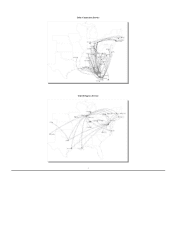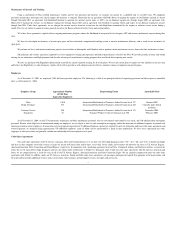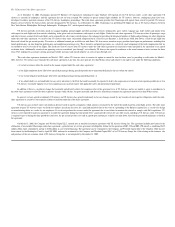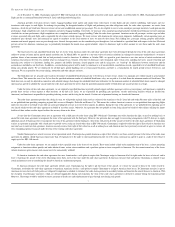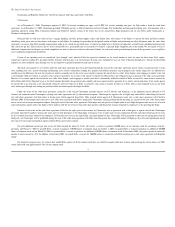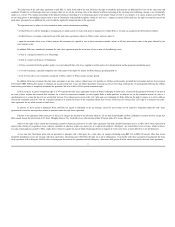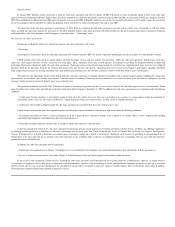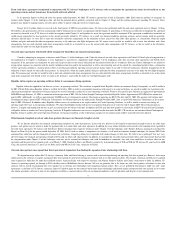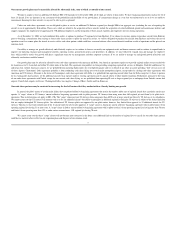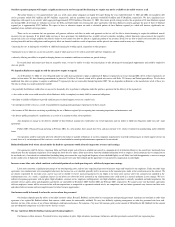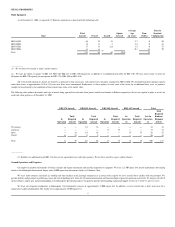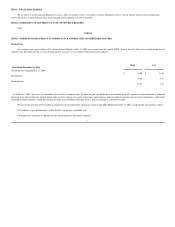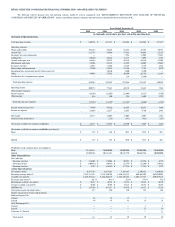Frontier Airlines 2004 Annual Report Download - page 20
Download and view the complete annual report
Please find page 20 of the 2004 Frontier Airlines annual report below. You can navigate through the pages in the report by either clicking on the pages listed below, or by using the keyword search tool below to find specific information within the annual report.
If our code
-
share agreement is terminated in connection with US Airways' bankruptcy or US Airways seeks to renegotiate the agreement on terms less favorable to us, our
operating revenues and net income may be materially adversely affected.
In its Quarterly Report on Form 10
-
Q for the quarter ended September 30, 2004, US Airways reported that it had, in September 2004, filed voluntary petitions to reorganize its
business under Chapter 11 of the bankruptcy code, and that the potential adverse publicity associated with its Chapter 11 filings and the resulting uncertainty regarding US Airways' future
prospects may hinder its ongoing business activities and its ability to operate, fund and execute its business plan.
Except for $3.2 million which we reserved in the third quarter of 2004 for pre
-
petition claims, US Airways has performed under the code
-
share agreement since its Chapter 11 filing.
Nevertheless, the agreement has not been assumed and could be terminated in its entirety in connection with the Chapter 11 proceeding, or US Airways could seek to renegotiate the agreement
on terms less favorable to us. If US Airways is unable to reorganize under Chapter 11 and liquidates its assets, the agreement would be terminated. If the agreement is modified or terminated, we
would remain responsible for lease payments on the aircraft previously utilized by US Airways. As a result, our financial condition, operating revenues and net income could be materially
adversely affected unless we were able to enter into satisfactory substitute arrangements for the utilization of these aircraft for other code
-
share partners, or, alternatively, obtain the airport
facilities and gates and make the other arrangements necessary to fly under our own flight designator code. We cannot assure you that we would be able to enter into substitute code
-
share
arrangements, that any such substitute code
-
share arrangements would be as favorable to us as the current code
-
share arrangement with US Airways, or that we could, in the alternative,
successfully fly under our own flight designator code.
Our code
-
share agreements with United will be terminated if United does not emerge from bankruptcy.
United is attempting to reorganize its business under Chapter 11 of the bankruptcy code. Under the terms of our code
-
share agreements with United, if United's plan of reorganization is
not confirmed in its Chapter 11 bankruptcy or if its bankruptcy is converted to a liquidation under Chapter 7 of the bankruptcy code, then our code
-
share agreements with United will be
terminated. If the agreements are terminated, we must still accept for delivery the aircraft which had not been delivered but that we would have flown for United. Although we are entitled to
recoup certain expenses in connection with the aircraft, including certain fees paid to the manufacturer as well as our ownership costs of the aircraft for a transitional period of time, a termination
of these agreements could have a material adverse effect on our financial condition, operating revenues and net income unless we are able to enter into satisfactory substitute arrangements for the
utilization of these aircraft for other code
-
share partners, or, alternatively, obtain the airport facilities and gates and make the other arrangements necessary to fly under our own flight designator
code. We cannot assure you that we would be able to enter into substitute code
-
share arrangements, that any such substitute code
-
share arrangements would be as favorable to us as the current
code-
share arrangement with United, or that we could, in the alternative, successfully fly under our own flight designator code.
Republic Airline requires an operating certificate before it can commence flying operations.
Republic Airline has applied for, but does not yet have, an operating certificate. This certificate is required before Republic Airline can commence flying. Consequently, we will be unable to
fly ERJ
-
170s for Delta unless Republic Airline is certified. In October, 2004, in order to accommodate American with respect to its scope restrictions, we agreed to modify our Agreement with
American to preclude the continued use of larger regional jets on our Chautauqua Airlines Air Carrier Operating Certificate. We have also agreed to pay American an aggregate of approximately
$500,000 through February 19, 2005, in connection with our operation of ERJ
-
170s for United through Chautauqua instead of Republic Airline. Approximately $291,000 of this amount was
paid in 2004. Additionally, we will pay approximately $36,000 per day to American for each day Chautauqua is operating any ERJ
-
170s after April 21, 2005. This payment will continue until
Chautauqua no longer operates ERJ
-
170 aircraft. Consequently, we will most likely pay this daily penalty through November 2005. Also, as agreed with American, Chautauqua can fly no more
than 18 ERJ
-
170 aircraft. In addition, unless Republic Airline receives its certification or we acquire another Air Carrier Operating Certificate, we will be unable to execute our strategy of
operating single fleet types in our operating subsidiaries. We expect that Republic Airline will receive its required certification on or before the end of August 2005. The certification process,
however, is lengthy and complicated and we can give no assurance that we will meet this date. In addition, the FAA may limit how quickly we can transfer all ERJ
-
170 aircraft from Chautauqua
to Republic Airline or another Air Carrier Operating Certificate. If Republic Airline does not receive its required certification and if the ERJ
-
170 aircraft are not transferred from Chautauqua to
Republic Airline or another Air Carrier Operating Certificate, our financial condition, results of operations and price of our common stock could be materially adversely affected.
If the financial strength of any of our code
-
share partners decreases, our financial strength is at risk.
We are directly affected by the financial and operating strength of our code
-
share partners. In the event of a decrease in the financial or operational strength of any of our code
-
share
partners, such partner may be unable to make the payments due to us under their code
-
share agreement. In addition, they may reduce utilization of our aircraft to the minimum levels specified in
the code
-
share agreements. US Airways and United have filed to reorganize their respective businesses under Chapter 11 of the bankruptcy code. Further, Delta has announced in its Quarterly
Report on Form 10
-
Q for the quarter ended September 30, 2004, that if it fails to achieve a competitive cost structure, it will need to restructure through bankruptcy. In January 2005, Delta
announced fare reductions and the elimination of certain fare restrictions. Competing airlines have responded with similar changes to their fares. We believe that a prolonged "fare war" may
adversely impact the financial and operating strength of Delta and our other code
-
share partners. In addition, it is possible that our code
-
share agreement with a code
-
share partner that has filed
for reorganization under Chapter 11 of the bankruptcy code may not be assumed in bankruptcy and could be modified or terminated. Any such event could have an adverse effect on our
operations and the price of our common stock. As of March 7, 2005, Standard & Poor's and Moody's respectively, maintained ratings of WR and WR for US Airways, B
-
and Caa2 for AMR
Corp., the parent of American, CC and Caa3 for Delta and D and WR for UAL Corp., the parent of United.
Our code
-
share partners may expand their direct operation of regional jets thus limiting the expansion of our relationships with them
.
We depend on major airlines like US Airways, American, Delta and United electing to contract with us instead of purchasing and operating their own regional jets. However, these major
airlines possess the resources to acquire and operate their own regional jets instead of entering into contracts with us or other regional carriers. For example, American and Delta have acquired
many regional jets which they fly under their affiliated carriers, American Eagle, with respect to American, and Atlantic Southeast Airlines and Comair, with respect to Delta. In addition, US
Airways is operating regional jets through its PSA subsidiary and its MidAtlantic Airways division. We have no guarantee that in the future our code
-
share partners will choose to enter into
contracts with us instead of purchasing their own regional jets or entering into relationships with competing regional airlines. They are not prohibited from doing so under our code
-
share
agreements. A decision by US Airways, American, Delta or United to phase out our contract
-based code-
share relationships and instead acquire and operate their own regional jets or to enter
into similar agreements with one or more of our competitors could have a material adverse effect on our financial condition, results of operations and the price of our common stock.
15


